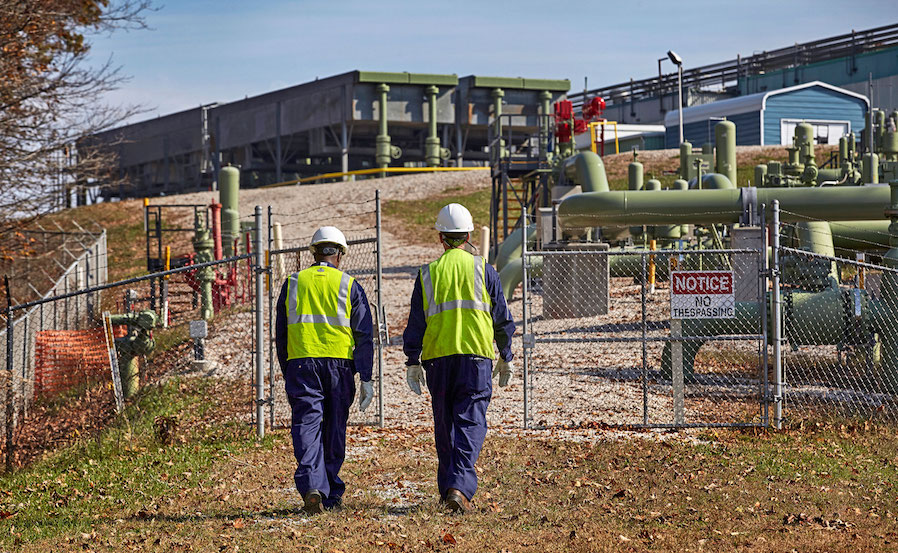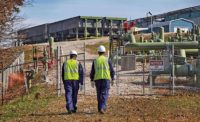About three years after being ranked as one of the slowest-growing construction markets in the country, West Virginia is turning the corner. And, thanks to the booming gas industry, the Mountain State could potentially see even more construction jobs moving forward.
According Associated General Contractors of America’s statistics released this month, West Virginia had a nation-leading 14.4% increase in new construction jobs, or 4,300 jobs, between January 2017 and January 2018. West Virginia had the fastest rate of construction job loss in the nation between March 2014 and March 2015. The state shed 2,400 jobs during that span, representing a 7.2% decline.
The latest numbers show that West Virginia, from a percentage standpoint, ranked above California (9.8%, 75,500 jobs), Nevada (9.7%, 7,800 jobs) and New Mexico (9.7%, 4,300 jobs) between January 2017 and January 2018.
Steve White, director of Affiliated Construction Trades, a division of the West Virginia State building trades, says the turnaround for construction is “great news for West Virginia” but that it has just put the state back to where it was before the state's economy collapsed. “Much of the commercial and government building construction remains depressed," he says. "The gas related work, meaning processing facilities and pipelines, has definitely picked up in the northern part of the state.”
Overall, 35 states and the District of Columbia added construction jobs during the same span, according to the AGC’s analysis of Labor Department data, while 32 states and D.C. added construction jobs between December and January.
In a press release announcing the figures, however, AGC chief economist Ken Simonson said the growth could be hurt by the Trump Administration’s tariffs on steel and aluminum. Simonson said. “many of the jobs are at risk if unwise tariffs push up materials costs, making projects unaffordable, and if the nation continues to underfund infrastructure investment.”
The report also noted that 15 states lost construction jobs between January 2017 and January 2018. North Dakota saw the worst percentage decrease with a whopping -15.8% decline, or 4,600 jobs cut. Iowa (-5.9%, -4,600 jobs), Nebraska (-3.1%, -1,600 jobs), Louisiana (-2.3%, -3,400 jobs,) and Missouri (-2.5%, -3,000 jobs) also lost jobs.
“It is noteworthy that the three states with the largest job gains were all recovering from natural disasters, in addition to having generally robust economies,” Simonson said. “The job losses in North Dakota and other Plains states may have more to do with severe weather conditions this January than a long-term downtrend.”
In West Virginia, major pipeline projects have kept workers busy. TransCanada put the Leach Xpress pipeline into service in January. The year-long project was constructed by 5,000 employees and contractors. New pipeline projects getting underway have the potential to bring even more construction jobs to the state. The Atlantic Coast Pipeline is slated to begin full construction later this spring.
But the state’s pipeline projects have faced significant delays due to environmental violations, legal challenges and protests. Construction on the $4.2 billion Rover natural gas pipeline was recently halted for the second time in nine months for failure to meet state water pollution control permit requirements.
Lawyers for the Mountain Valley Pipeline, which recently began tree felling, failed to convince a judge a judge on March 20 that protesters camping out in trees in the George Washington and Jefferson National Forests in West Virginia should be forced to move. Natalie Cox, a spokeswoman for the project said, “we understand that the efforts and progress we have made to plan and design a pipeline route that will protect cultural and historic resources, as well as preserve sensitive and environmental species, may not satisfy those opposed to underground, natural gas infrastructure.”
Meanwhile, White says the biggest economic driver for the region could be ethane cracker plants. Shell is building a $6 billion cracker project on the Ohio River in Pennsylvania near the West Virginia border. PTT Global Chemical has also proposed multibillion-dollar ethane cracker plant in eastern Ohio along the West Virginia border.
West Virginia’s road bond program approved by voters last fall is also expected to start producing jobs. The Department of Highways says it will pull $800 million from the bond market later this spring. “The question remains how much will go to local workers,” White says. “There's lot’s on the horizon but we are not yet significantly ahead of where we were a few years ago.”





Post a comment to this article
Report Abusive Comment